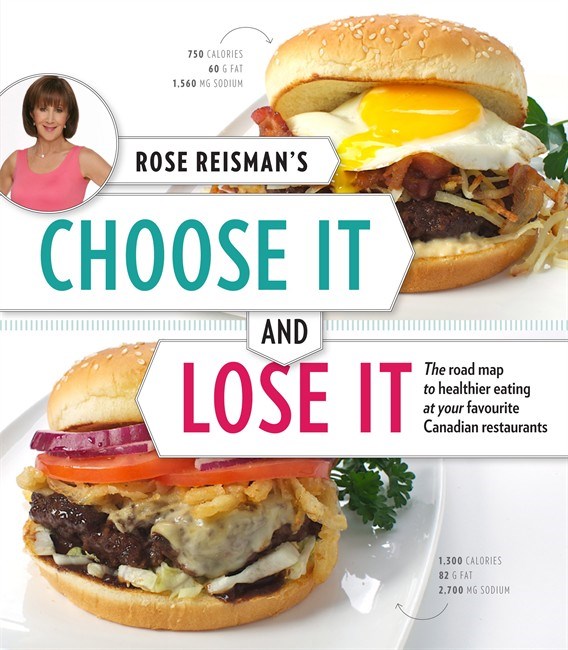TORONTO - Super Bowl celebrations don't have to mean an evening of gluttony resulting in a "food hangover" the next day, the result of consuming too much fat, sugar or salt.
Rose Reisman, a registered nutritional consultant based in Toronto, has some ideas on which foods to minimize during your football-watching soiree.
If you're planning to dine out or order in, she has plenty of tips for helping make smarter choices in her book "Rose Reisman's Choose It and Lose It" (Whitecap Books, 2012).
The main reason she wrote the book — her 17th — "is because I watch the obesity epidemic." She was part of a panel convened by Ontario Health Minister Deb Matthews that just handed in a proposal on how to reduce obesity in kids. Reisman is also an adjunct professor at York University's department of health.
"I realized this is a real problem. And the problem is that you can't tell people not to eat out because our lifestyle is such that people don't have the time to be preparing food at home, so I stopped barking up that tree and I said, 'You know what? It's like the old line — if you can't beat them join them.'"
Reisman says fast food is a reality of our busy lives. But in her book she explains how to make informed decisions about "better-for-you" options at more than 60 fast-food restaurants, coffee shops and restaurant chains. She lays out which menu items to avoid, which to indulge in and explains why one choice may be better than another.
"You can still have everything you want — just the better choice, is all," Reisman explained in a telephone interview.
If you're hosting a gathering to watch this Sunday's big game in New Orleans, you can control the calories, fat, sugar and sodium in homemade food and offer healthy choices in takeout or prepared items.
"People feel obligated at Super Bowl or big parties to bring the most fattening, disgusting foods ever and you can really try to make up some fabulous foods," said Reisman. "You can take a flank steak and drizzle on a teriyaki sauce and serve it as a main course and it's way better for you than the deep-fried wings."
Many football fans think the day wouldn't be complete without wings. Opt for a barbecued version rather than breaded and deep-fried, which adds more calories and fat.
Reisman suggests a sandwich buffet with a variety of rolls, roasted turkey, meatballs and lots of veggies. "Let people make their own rolls up. That's always fun for people to do."
Most guests will enjoy a bowl of hearty chili. Make it with lean turkey or chicken or extra-lean beef.
"It's really shocking the difference when you have a medium-ground beef versus lean or extra lean," said Reisman. "You can jazz it up by adding a little extra cheese at the end, a little low-fat sour cream, some avocado. You won't notice the missing fat in the beef if you choose a leaner cut. Also you'll see when you're serving your chili an inch of oil on the top if you're serving a fatty meat."
A lot of people can't tell the difference between ground beef and ground soy, which doesn't contain saturated fat, an unhealthy fat that's naturally found in foods from animals such as fatty cuts of meat, poultry with the skin on and higher-fat milk, cheese and yogurt, according to the EatRight Ontario website.
"The foods you want to minimize are piggies in a blanket, anything that's made with puff pastry — that's usually a form of lard. Little hotdogs — it's really not even made of real meat," Reisman noted.
Salami is not only high in fat but contains nitrates, a type of preservative.
Ranch or cheese-based dips are a killer in calories, Reisman said. Instead, put out hummus, salsa or a light salad dressing with crudites and baked rather than fried chips.
Learn the lingo on menus.
"When you see lightly breaded, that always means deep-fried. When you see the words creamy, puree, ask whether it has butter or cream in it," she said. "Lightly sauteed" also usually means deep-fried.
Reisman found when researching the book that much of the online information can be deceiving and some websites are easier to decipher than others.
"They won't tell you they're not counting the sides or the salad dressing or the roll, so people will eat that meal in a restaurant and have no clue that those extra things aren't what the calories are showing or the fat."
The real shocker, she found, was salads. "We were all led to believe, 'Have salads and you'll be healthier.'"
But the moment a "crispy something" or cheese or eggs are added, that raises the unhealthy quotient.
"The other thing I learned: you never allow them to control your dressing," Reisman said. Always ask for it on the side so that you can moderate how much you use.
A main-meal salad such as romaine lettuce with vegetables, chicken and croutons can have up to 75 millilitres (1/3 cup) of dressing.
"When it's a caesar-type dressing most of that is all fat. You're putting 600 or 700 calories away of nothing food and that's one of the reasons you're having trouble with your weight."



